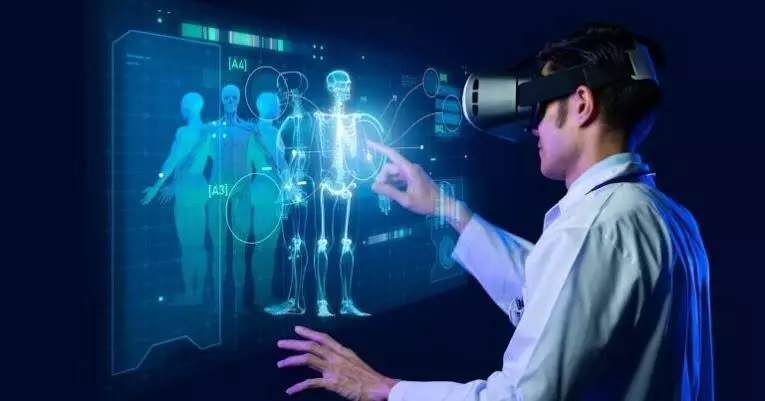How AI is helping in diagnosis, prediction, and precision
The early diagnosis and prediction are helping the combat process be simpler and cost-effective
By Neelambaran A
Representational Image.
Hyderabad: Artificial Intelligence (AI) has revolutionized the healthcare sector through a variety of applications. The capacity to detect diseases from medical images with high accuracy has been obtained through machine learning algorithms. The advancement is gaining critical recognition in crucial departments like oncology and cardiology among other specializations.
The process of diagnosis, treatment, and prediction has drastically changed, thanks to the easy availability of AI tools that have helped the experts in planning and treating patients. The early diagnosis and prediction are helping the combat process be simpler and cost-effective.
The deployment of robots in surgeries that require high precision including orthopedic oncology and spine, has not only increased the effectiveness of the surgeries but ensured the extension of the lifespan of the patients. The efficiency, accuracy, and accessibility of healthcare have advanced due to the developments in AI.
Increased precision and effectiveness in diagnosis
The process of diagnosis is crucial in the medical field with the experts looking for the exact condition of the patients to decide on the necessary treatment. The use of AI also reduces possible human error. Though the technology has been in existence for a few years now, better affordability has expanded its use.
Dr. Kishore B Reddy, Head of the Orthopaedics and Ortho Oncology department, Amor Hospital, Hyderabad said, “The use of AI and machine learning has increased in orthopaedics. AI is used in diagnosis, including reading the X-rays, MRI and PET scans”.
The quick prediction of the AI coupled with the capacity to even point out the problems, which are missed by experts, emphasizes the importance of the tool.
Dr. L Kiran Kumar Reddy, interventional cardiologist at Onus Heart Institute, Hyderabad said, “We are using AI in imaging which is vital in cardiovascular diseases”.
The Standard Uptake Value (SUV) for the PET scans is derived with the help of AI, in addition to improved accuracy, reduced radiation exposure due to repeated scanning in case of errors, better accuracy, and reduced cost involved.
Predicting conditions helping patients
Prediction has remained a challenge in the medical field, with people falling ill due to various reasons, without showing any symptoms. Cardiovascular diseases and cancers have increased across the globe.
The deployment of AI has dramatically improved the prediction of the occurrence of any specific conditions. This empowers the experts to carry out adequate interventions to prevent the conditions.
“For people with bone weakness, particularly women above the age of 50, AI can play an important role in predicting future fractures. Depending on the morbidities, age, and other factors, we can suggest medications to delay or even prevent the condition. The same is the case of knee joint problems, which are increasing among the 40 years age group people in India. We can estimate the lifespan of the joint and intervene accordingly”, Dr Kishore added.
Cardiovascular diseases also require similar interventions, since most people remain unaware of the preexisting conditions. With increasing sudden deaths among the adult population, AI can play a very constructive role.
“With the help of AI, we can achieve 36% improvement in prediction of conditions. The future abnormalities can be predicted and the severity can be reduced”, Dr Kiran Kumar added.
The possibility of tumor recurrence can also be estimated and combat measures can be adopted.
High precision in surgeries
Several surgeries require high precision, including spine and orthooncology surgeries. The precision can ensure the high efficiency of the surgeries and the factors including reduced damage to other parts of the body and organs during such precise and prolonged surgeries.
“A common challenge or error in spine surgery is the level of identification by the experts. This is mitigated by AI. Treating spine and joint replacement patients with the help of robots has gained more prominence”, Dr Kishore said.
He also explained the importance of AI in Orthopaedic oncology in the precise removal of tumors, protecting the joints, and expanding the lifespan.
“The AI helps in removing the exact place of the presence of a tumor without sacrificing more. In this way we can retain mobility and help the patients”, he said.
The algorithms in AI can be used to predict if a patient is prone to develop any other conditions. Based on the available data, including the reports, it can suggest if a patient requires intense follow-up or normal follow-up.
Several hospitals and industry partners continue to impart training to the experts to ensure the technological developments are reaching patients from the remotest places across the country.